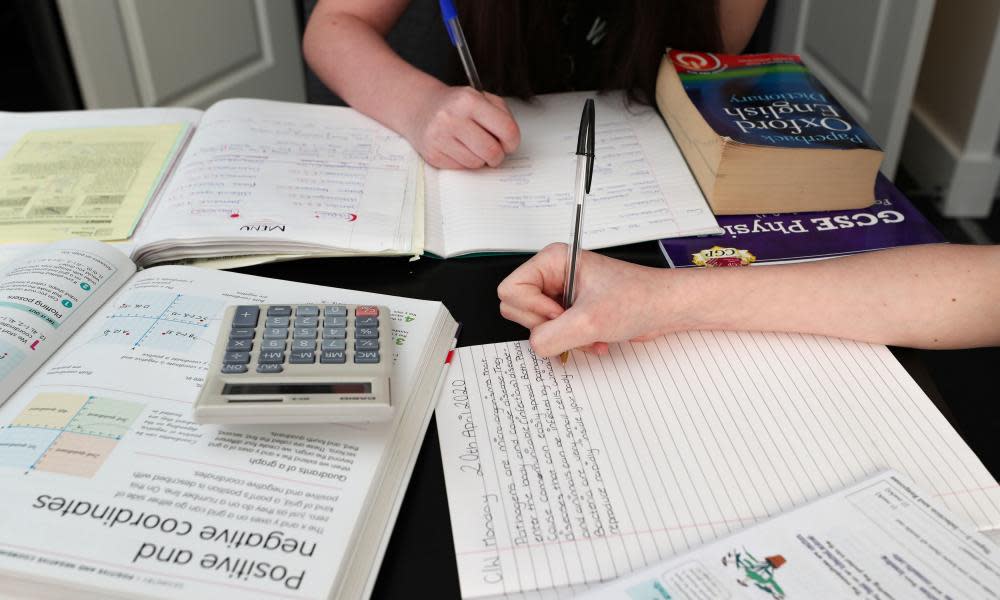How are exam grades being decided in England this year?

What happened with exams this year?
The government cancelled GCSE and A-level exams in England in March because of the Covid-19 pandemic. The administrations in Wales, Scotland and Northern Ireland did the same with their exams.
How will grades be decided this year?
Grades in England will be “standardised”, taking into account teachers’ assessments and class rankings, a student’s prior attainment (GCSE results for those taking A-levels, and Sats for those taking GCSEs), and their school’s performance in recent years.
The influence of teacher assessments will vary depending on the numbers taking a school’s courses: a course with five or fewer candidates will use the assessments in deciding grades, but larger courses with more than 15 candidates will ignore assessments and rely on prior attainment and a school’s previous results.
Teachers will still have a major say by creating the class rankings that will distribute grades. A pupil put at the top of the ranking will receive the highest grade allotted to that school by Ofqual.
Related: Nearly 40% of A-level result predictions to be downgraded in England
Why is this controversial?
Because “standardisation” seems to largely mean “adjusted downwards by an algorithm” compared with teacher assessments submitted earlier in the summer. Analysis of the statements and data published so far by Ofqual, the exams regulator in England, suggests 39% of grades will be downgraded.
Ofqual says its system is designed to ensure this year’s results are in line with those of previous years. But last week’s exam results day in Scotland was described as a “shambles” after close to 125,000 predicted grades – a quarter of the total – were adjusted by the Scottish Qualifications Authority. Only about 9,000 went up during the process.
Now all eyes are on England because the statistical model being used to predict English exam results shares basic principles with the Scottish one.
Who might get lower grades than they deserve?
Education experts in England warn that students in rapidly improving schools – likely to be in the most disadvantaged areas – may be penalised for previous poor results.
Jon Coles, the head of the biggest academy trust in England and a former official at the Department for Education, has said Ofqual’s data shows the previous years’ results cannot accurately predict this year’s for most schools. That will be particularly true for rapidly improving schools.
MPs have said they are especially worried about black, Asian and minority ethnic pupils, and those with special educational needs.
Can schools challenge exam results?
Yes. They can argue on a number of grounds, including if the school has been through a major change of leadership that has turned around its teaching record. Schools can also challenge results if they were expecting “exceptional” results compared with previous years, or if past results were distorted by a “monumental event” such as a flood or fire, or the school has undergone substantial demographic change, such as from being a single-sex school to a mixed one.
Can individual students complain?
Not on academic grounds. They can appeal through their school or college, but only on the grounds that the process was not followed correctly. If they suspect their grade was influenced by bias or discrimination, they can appeal against malpractice through their school or exam centre.
Do students have any other options?
Yes. They can sit A-level exams in October or GCSE exams in November. But the offer is unpopular with headteachers, who fear that revising for GCSE “retakes” will cut into teaching time for pupils in the first year of their A-level course.
What has Ofqual said?
Ofqual revealed that predicted grades submitted by schools and colleges were about 12 percentage points higher than last year’s outcomes at A-level, and nine percentage points higher at GCSE – with peaks at key grades such as 4 at GCSE, which is a pass, and B at A-level, which can be required for university entrance.
“Improvement on such a scale in a single year has never occurred, and to allow it would significantly undermine the value of these grades for students,” the regulator said.


